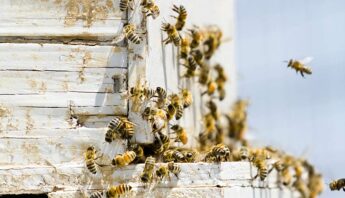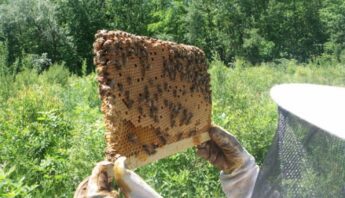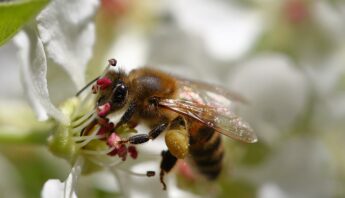FOR IMMEDIATE RELEASE
Contact:
Lex Horan, Pesticide Action Network
651.245.1733; lex@panna.org
Coalition delivers a basket of pollinator-reliant fruits, vegetables and honey to thank MDA and call for policy change on bee-harming pesticides
St. Paul, MN—On Tuesday morning, a group of 35 beekeepers, farmers, gardeners and others concerned about declining populations of honey bees and native pollinators delivered a message to the Minnesota Department of Agriculture (MDA): Be a #MNpollinatorhero, suspend neonicotinoid pesticides! The group gathered outside MDA’s building in downtown Saint Paul and held a short rally with speeches and performances before entering MDA’s public lobby and offering a basket of fruits, vegetables and honey—all of which rely on pollinators—to the Department.
MDA is currently conducting a special registration review of neonicotinoids. In the coming months MDA will decide whether to create new restrictions on the use of these pesticides, which are one of the driving factors behind pollinator declines. In August, the agency launched a public relations campaign calling on every Minnesotan to become a #MNpollinatorhero by planting flowers in their backyards and changing their individual choices about pesticide use. Although MDA has the authority to amend Minnesota pesticide policy to protect bees from neonicotinoids, thus far the agency has kept the onus on individuals.
“We’re here today with a two-part message: we’re grateful that the Minnesota Department of Agriculture has invested much-needed resources towards protecting pollinator health, and now we want to see MDA finish the job by phasing out neonicotinoids statewide,” said Lex Horan, Minneapolis-based organizer with Pesticide Action Network. “MDA has examined the science and heard from the public, and there is resounding interest in phasing out the widespread use of neonicotinoids. We fully expect that within the next few months the agency will roll out a plan to suspend neonicotinoids.”
Jim Riddle, owner of Blue Fruit Farm, Winona, MN, and Minnesota Farmers Union member since 1983, attended the event and delivered short remarks to the group. “A few weeks ago, the Minnesota Farmers Union voted to support a five-year moratorium on neonicotinoid insecticides until research on their environmental and health impacts is complete," said Riddle. "Honey bees and pollinators are critical to farm ecosystems, and Minnesota must protect its pollinator populations from harmful pesticides if we hope to keep our agricultural economy strong.”
Neonicotinoids are the most widely used class of insecticides in the world. They are commonly used in agriculture as seed coatings on crops like corn and soybeans, as well as in nursery plants and home gardens. In October, EPA released findings that neonicotinoid seed treatments produce no consistent increase in yield in soybeans. The Center for Food Safety found similar results in a review of research on corn, canola, dry beans and wheat.
Earlier this year, 29 independent scientists from the International Union for the Conservation of Nature reviewed more than 800 peer-reviewed studies—a review called the Worldwide Integrated Assessment. This body of scientific evidence shows that neonics pose a serious threat to the health of honey bees and native pollinators. This group of scientists recommended regulatory action to phase out neonicotinoids.
In 2012, the European Union implemented a two-year moratorium on neonicotinoids. This November, Ontario released plans to restrict the use of neonicotinoid seed treatments by 80% in the next two years. In Minnesota, pending state and federal action, the City of Shorewood has passed a resolution to cease neonicotinoid use on city property.
According to USDA’s National Agricultural Statistics Service, Minnesota has historically been one of the top five honey-producing states in the country, with honey production contributing an average of $9-13 million annually towards the state’s agricultural economy. However, in recent years, Minnesota beekeepers have lost more than 50% of their colonies annually and the state’s honey production has fallen.
###







